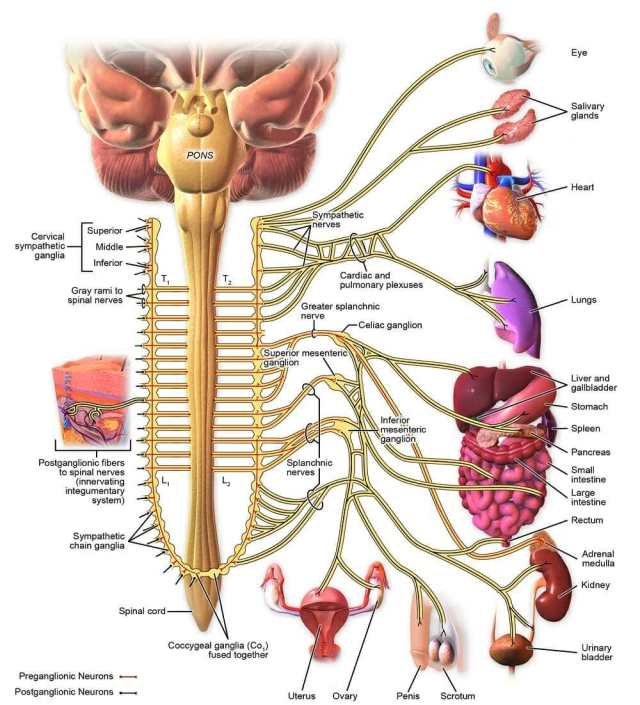RSD/CRPS can involve internal organs requiring innovative and costly approaches to treatment for pain relief due to its unique nature.
RSD/CRPS invariably involves the internal organs, since usually the skin surface is cold at the expense of increased circulation to the internal organs. This increased circulation can cause osteoporosis, fractures of bone, abdominal cramps and diarrhea, disturbance of absorption of foods with resultant weight loss, water retention with aggravation of premenstrual headaches and depression, persistent nausea and vomiting, as well as severe vascular headaches mistaken for “cluster headache”.
In addition, the sympathetic dystrophy can cause the complication of intractable hypertension which responds best to alpha I blockers (Dibenzyline, Hytrin, or Clonodine). The RSD/CRPS can cause attacks of irregular or fast heart beat, chest pain, coronary artery spasm (angina), as well as disturbance of function of other internal organs. A few examples are frequency and urgency of urination, respiratory disturbance such as dyspnea and apneic attacks, and attacks of severe abdominal pain.
Laparoscopy may reveal congestion and inflammation of the ovaries, uterus or small bowel.
Attacks of fluctuating blood pressure may also be accompanied by constriction of the blood vessels to the kidney resulting in periodic bleeding in the urine as well.

The Sympathetic NervesThe internal organs complication may become aggravated by traumatic effect of sympathetic nerve blocks. One such complication is accidental trauma to the kidney with resultant hematuria (blood in urine) and aggravation of hypertension.
Nerve blocks and more importantly physical therapy help improve the skin circulation and reduce the deep circulation calming down the inflammatory affect of RSD/CRPS over the internal organs. As mentioned above, alpha I blockers are quite affective in treatment of this condition.
Attacks of swelling of the internal organs complicated by intermittent constriction of the blood vessels to different organs can result in chest pain, attacks of sharp central pain (stabbing severe pain in the chest or abdomen), and changes in voice (suddenly developing a temporary “chipmunk” type of voice change). The sharp, stabbing, central pain can be helped with treatment with medications such as anticonvulsant (Tegretol or Neurontin).
The use of catheters adjacent to the sympathetic change such as in the lumbar sympathetic change can help prevent repeated needle infection for sympathetic nerve blocks. However, because of the congestion of the internal organs the catheter may irritate the sympathetic nerve branches causing constriction of the blood vessels to the spinal cord with temporary paraplegia. As soon as the weakness of extremities develops, the catheter should be removed. Not heeding to this ominous sign can result in paralysis of the lower extremities and incontinence.
The same congestion of internal organs can also cause hypersensitivity to smell and aversion to taste of certain foods.


